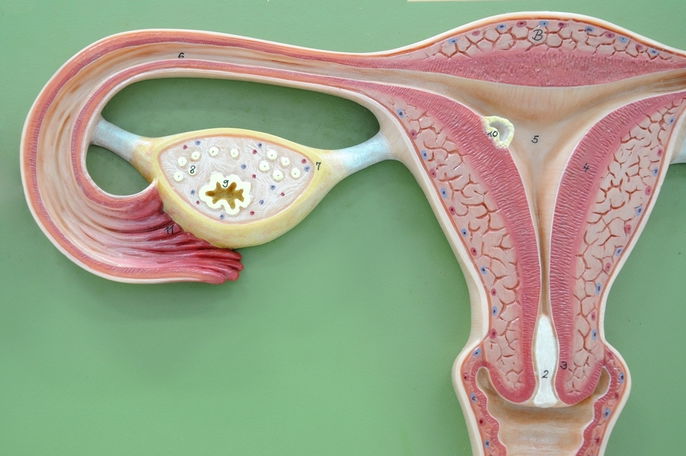Late ovulation is characterized by ovulation that occurs after the time it was expected to have happened, usually after the 21st day of the menstrual cycle. Ovulation can be late by days or weeks to months.
Late ovulation can lead to a late period,and can happen even in women who have a normal, regular period.
Generally, ovulation occurs in the middle of the menstrual cycle, which lands on the 14th day of a 28.day menstrual cycle. However, ovulation can be late due to factors like stress, thyroid problems or medication use.

Common symptoms
Late ovulation does not normally cause any signs or symptoms. Some women may report a heavier period, due to increased hormone production that occurs before ovulation.
Just like normal ovulation, ovulation that occurs later on can lead to similar symptoms, like changes in cervical mucus (which becomes thin and transparent like egg whites) and mild abdominal pain. Read more about ovulation symptoms that women can experience.
Ovulation calculator
Use our calculator below to determine when you ovulate:
Why did I ovulate late?
Late ovulation is usually caused by:
- Stress, which can negatively impact hormonal regulation;
- Thyroid disease, which affects the pituitary gland and its release of LH and FSH hormones (which stimulate ovulation)
- Polycystic ovary syndrome, which is characterized by higher testosterone levels that lead to irregular periods
- Breastfeeding, which is associated with higher prolactin levels to stimulate milkd productions, but also suppresses ovulation and mensturation
- Medications, such as some antipsychotics, prolonged use of some non-steroidal anti-inflammatories and consumption of illicit drugs, such as marijuana and cocaine.
Although late ovulation is often associated with psychological or hormonal condition, it can be an expected finding in women with longer cycles (over 28 days). In these cases, treatment is not always necessary.
Does late ovulation mean more difficulty getting pregnant?
Late ovulation does not always compromise fertility. However, women with irregular periods may have more difficulty predicting their fertile period and have trouble knowing when they are ovulating. This can make timing unprotected sex to achieve pregnancy more challenging.
Also recommended: How to Calculate Your Fertile Window (Online Calculator) tuasaude.com/en/fertile-windowHow to treat
It is important to know the length of your menstrual cycle, as longer cycles will commonly have a later ovulation, which can be normal.
However, when late ovulation is persistent and unrelated to a longer cycle, it may be a sign of another underlying condition. If you have any doubts, you should see your gynecologist for assessment and treatment as necessary. The doctor may prescribe hormonal replacement therapy, for example, in cases of thyroid disease affecting ovulation.
If the cause is not fully clear, but you are trying to get pregnant, your doctor may consider prescribing medications to help regulate your menstrual cycle.





























